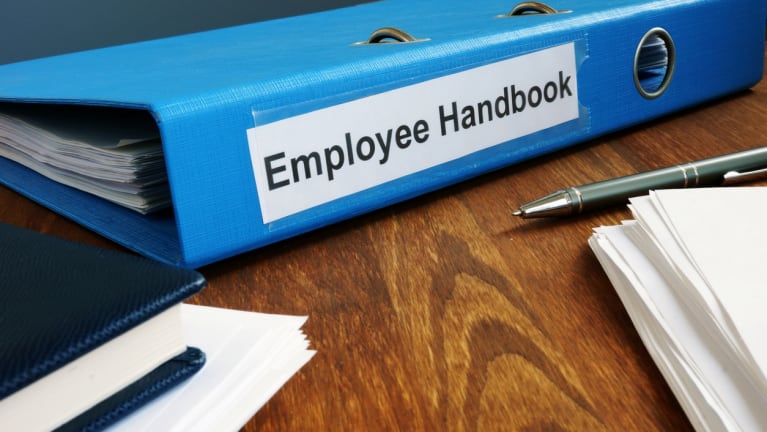
Employers who are revising disclaimers and policies in response to a National Labor Relations Board (NLRB) decision in August should replace broad, ambiguous wording with specifics.
“The main takeaway is that employers should review all policies that regulate employee behavior and conduct in light of the business purpose the employer wants to achieve through the policy,” said Brian Balonick, an attorney with Fisher Phillips in Pittsburgh. “Carefully defining the business purpose will help employers craft specific policies that meet a specific business purpose. That is the thrust of the Stericycle decision.”
Stericycle Decision
In Stericycle, an administrative law judge found that the employer violated the National Labor Relations Act (NLRA) by maintaining certain rules for its employees that addressed personal conduct, conflicts of interest and confidentiality of harassment complaints. The NLRB announced a new standard for whether work rules violate the NLRA and sent the case back to the judge to consider the ruling in light of the new standard.
Under that standard, if an employee could reasonably interpret the work rule to have a coercive meaning, the NLRB general counsel would have met her burden to prove that the rule has a reasonable tendency to chill employees from exercising their NLRA rights.
The board clarified that it will interpret the rule from the perspective of an employee who is subject to the policy, is economically dependent on the employer and contemplates engaging in protected concerted activity. If the general counsel provides such proof, the rule is presumptively unlawful. However, the employer may counter the presumption by proving that the rule advances a legitimate and substantial business interest and that the employer can’t advance that interest with a more narrowly tailored rule.
Sample Disclaimer
A possible disclaimer for an employee handbook would cite the NLRB general counsel’s description of a sufficient disclaimer, according to Peter Spanos, an attorney with Taylor English in Atlanta, and might state:
Policy Recognizing Employee Rights Under the National Labor Relations Act
Section 7 of the National Labor Relations Act (“the act”) guarantees employees the right to self-organization, to form, join, or assist labor organizations, to bargain collectively through representatives of their own choosing, and to engage in other concerted activities for the purpose of collective bargaining or other mutual aid or protection, as well as the right to refrain from any or all such activities. Section 8(a)(1) of the act makes it an unfair labor practice for an employer to interfere with, restrain or coerce employees in the exercise of the rights guaranteed in Section 7 of the act.
Nothing in this handbook will be interpreted, applied or enforced to interfere with, restrain or coerce employees in the exercise of their rights under Section 7 of the National Labor Relations Act. To the extent that you are an employee covered by the act, nothing in this handbook prevents you from:
a) Organizing a union to negotiate with the company concerning your wages, hours, and other terms and conditions of employment.
b) Forming, joining or assisting a union, such as by sharing employee contact information; talking about or soliciting for a union during nonwork time, such as before or after work or during break times; or distributing union literature during nonwork time, in nonwork areas.
c) Discussing wages and other working conditions with co-workers or a union.
d) Taking action with one or more co-workers to improve working conditions by, among other means, raising work-related complaints directly with the employer or with a government agency, or seeking help from a union; striking and picketing, depending on its purpose and means; and taking photographs or other recordings in the workplace, together with co-workers, to document or improve working conditions, except where an overriding employer interest is present.
e) Wearing union hats, buttons, t-shirts and pins in the workplace.
f) Choosing not to engage in any of these activities.
However, Robert Boonin, an attorney with Dykema in Ann Arbor, Mich., cautioned, “Employers should not take comfort by relying on disclaimers, at least until a court of appeals holds the NLRB’s hostility to them is misplaced.”
Policy Changes
Among the many policy revisions needed following Stericycle, Spanos gave the following example of one possibility for a revised personal conduct policy:
If you decide to offer complaints or criticism, avoid using statements, social media posts, photographs, video or audio that reasonably could be viewed as unlawful, knowingly or recklessly false, or constitute unlawful harassment of one or more co-workers. Examples of such conduct might include false defamatory communications meant to harm someone’s reputation, statements about the company that you know are false, or posts that could contribute to a hostile work environment on the basis of race, sex, disability, age, national origin, religion, veteran status, or any other status or class protected by law.
He said a policy restricting statements to media or agencies on behalf of the company might be revised to say:
From time to time, the company may become involved in news stories or potential or actual legal proceedings of various kinds. When that happens, lawyers, former employees, newspapers, law enforcement agencies, and other outside persons may contact the company to obtain information. If you receive such a contact, you should not speak on behalf of the company. Make it clear in your social media activity, discussions with third parties or interviews with media that you are speaking only on your own behalf. This policy does not prevent communications with government agencies about events or concerns in the workplace.
Any policies that are overly broad or general should be evaluated for revision, said David Pryzbylski, an attorney with Barnes & Thornburg in Indianapolis.
A policy that prohibits insubordination should likely be revised to identify examples of conduct that the rule is intended to address and not address, said Amy Schwind, an attorney with Lowenstein Sandler in New York City.
No policy is categorically lawful or unlawful, cautioned Sul Ah Kim, an attorney with Seyfarth in Atlanta.


